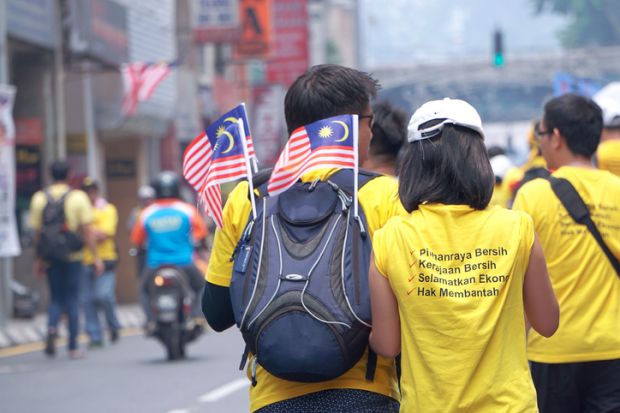In a reversal of previous assurances, Malaysia’s higher education minister has said that the government will put a stop to the practice of political parties setting up youth wings at universities.
Datuk Seri Khaled Nordin said that the establishment of political branches on campuses was not “appropriate”.
“I assure you that no political party branch will be established in the university,” he told the country’s parliament. “I think that is a decision accepted by all.”
In south Asia, and Malaysia more specifically, party affiliated student groups have proved controversial, with supporters saying they give students a chance for civic involvement, whereas critics argue that such groups can cause polarisation and even incite violence on campuses.
But academics said they did not believe the decision was a step in the right direction.
“This is not a good idea,” said Munirah Alatas, a visiting professor in the faculty of social sciences at the Indonesian International Islamic University.
She said that student activism had been “very influential” in Malaysia’s history, noting prime minister Anwar Ibrahim’s own involvement in student politics.
“If the current government truly wants to reform higher education, why silence the stakeholders, meaning the students?” she said. “We need an informed youth to act as another layer of checks and balances for a government that is trying to reform what has been political chaos.”
Bridget Welsh, honorary research associate with the University of Nottingham Asia Research Institute Malaysia, based in Kuala Lumpur, agreed.
“There was an expectation that, with the Anwar government, there’d be more liberalisation and discussion in campuses,” she said.
However, the current administration had brought “more of the same”, she said, appearing to follow the lead of previous political leaders in failing at “opening up the political space” for students.
Dr Welsh noted that vice-chancellors – who are political appointees – already controlled which speakers they invited to campus.
“Opposition parties were never really allowed on campus,” she said.
She added that she believed the government’s move to formally ban student political organisations was “paternalistic” and politically motivated. “The bigger issue is that they’re afraid the opposition is going to use students for political mobilisation. The perception is that younger voters are voting for the opposition, especially Malay voters.”
Times Higher Education has contacted the Malaysian government for comment.
Register to continue
Why register?
- Registration is free and only takes a moment
- Once registered, you can read 3 articles a month
- Sign up for our newsletter
Subscribe
Or subscribe for unlimited access to:
- Unlimited access to news, views, insights & reviews
- Digital editions
- Digital access to THE’s university and college rankings analysis
Already registered or a current subscriber?








